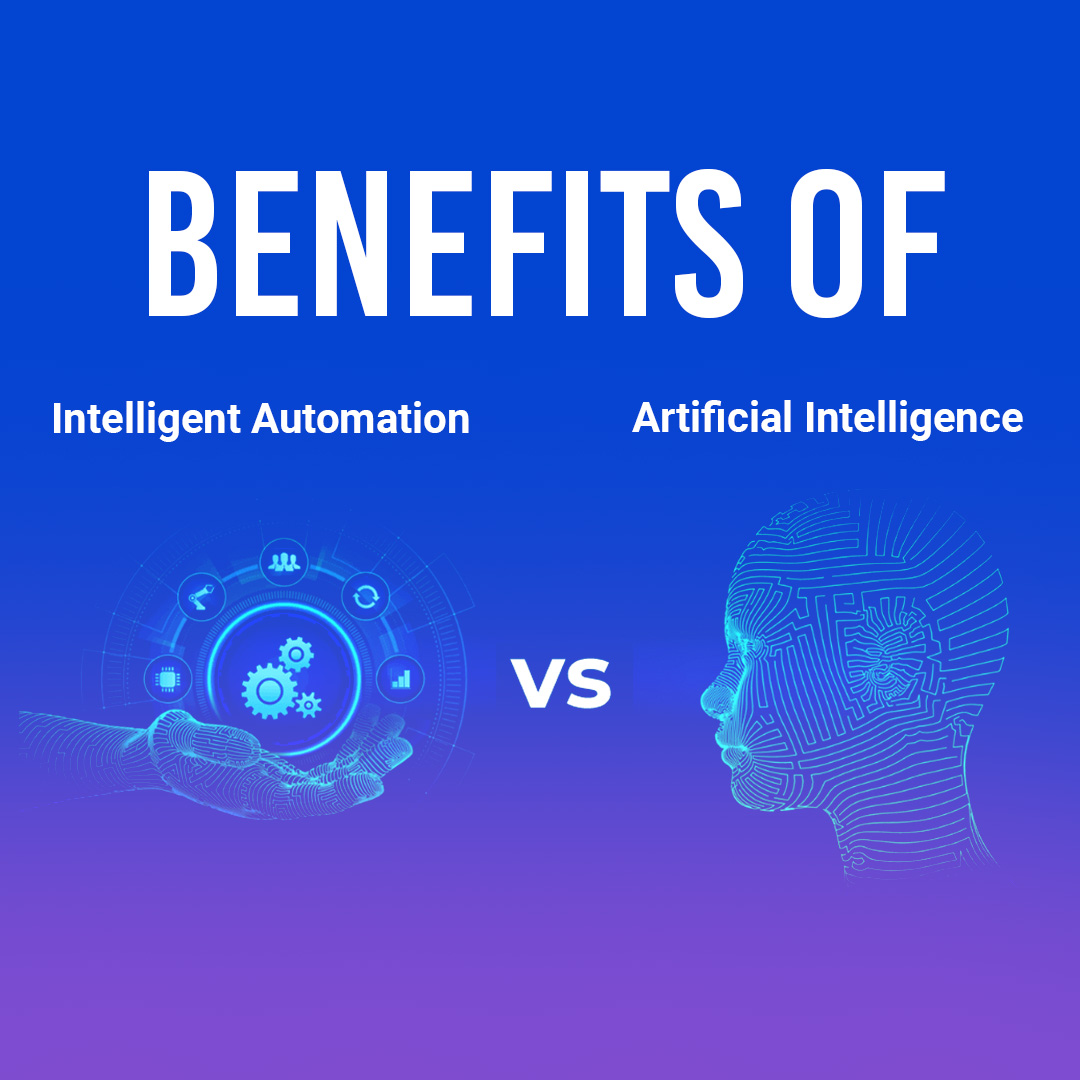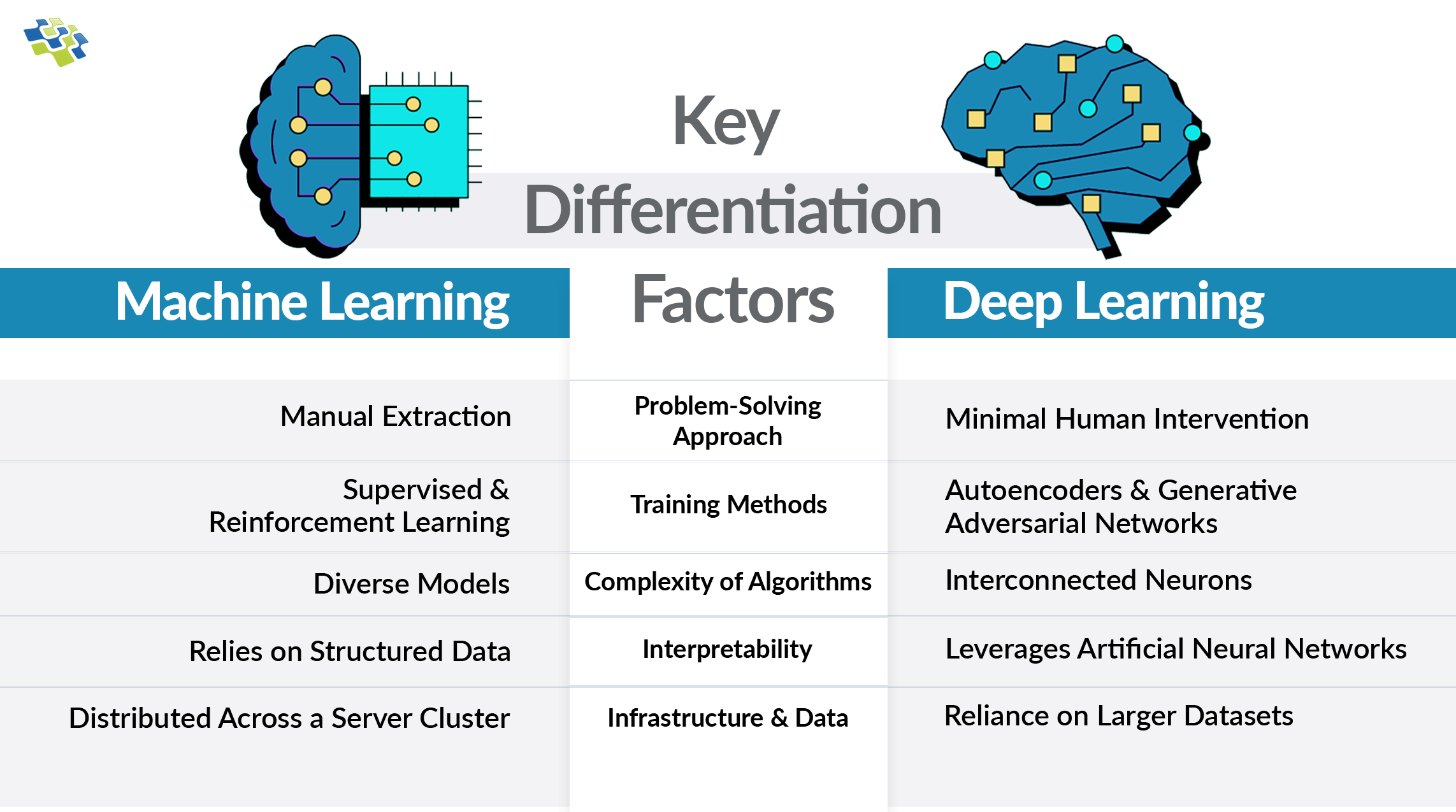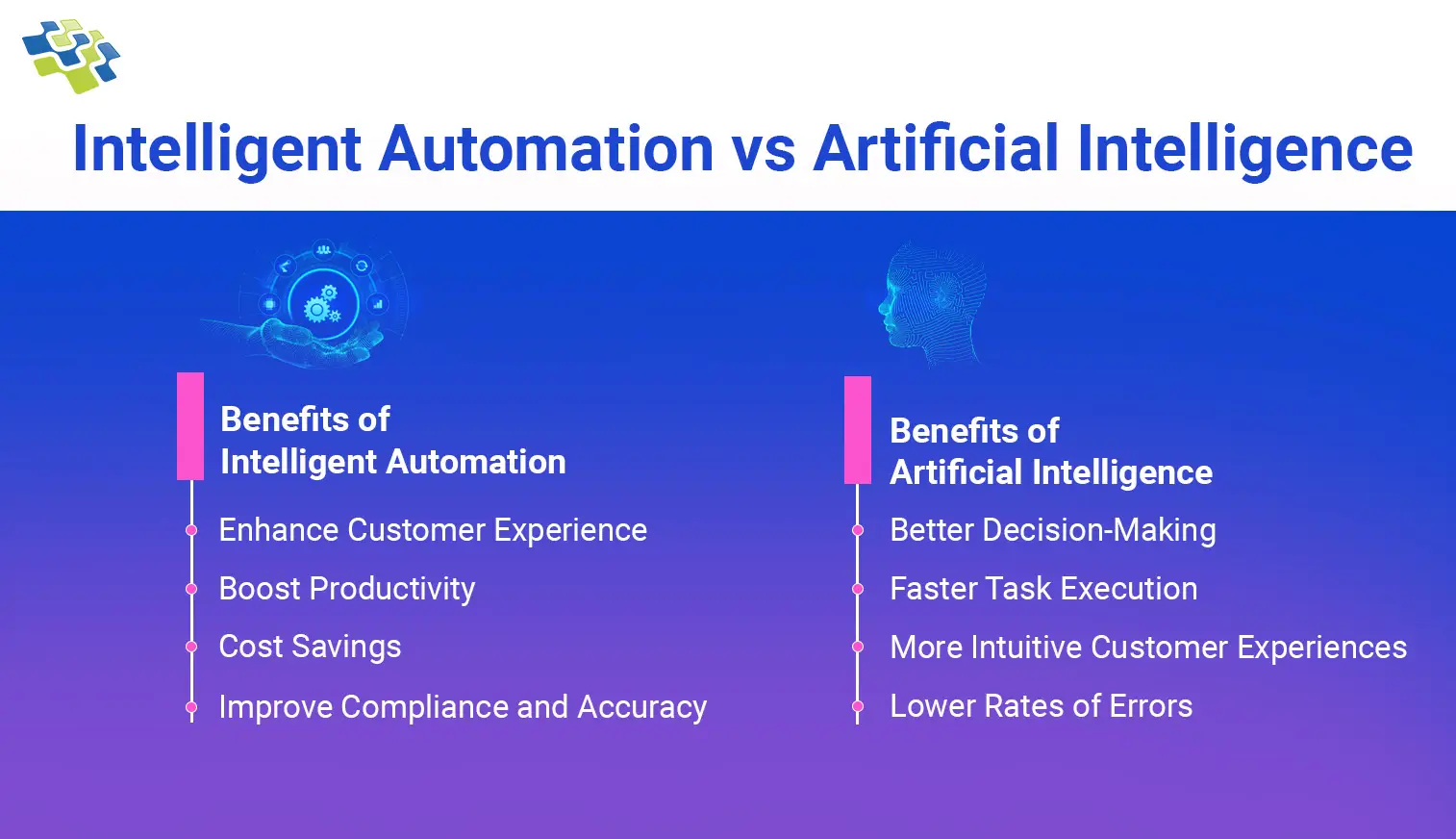Everything You Need to Know About AI vs IA
It’s essential to recognize that AI and intelligent automation are symbiotic—AI serves as the enabling tool, while intelligent automation represents the overarching strategy. To achieve optimal efficiency, businesses or organizations must leverage both.

Enhance Your Product Features with our Artificial Intelligence Development Services

“The intelligent process automation market, valued at USD 13.2 billion in 2022, is projected to grow at a CAGR of 14.6%, reaching around USD 51.35 billion by 2032. This reflects a significant expansion, emphasizing the increasing adoption of automation technologies across industries.”- Precedence Research
Artificial Intelligence Overview
Artificial intelligence entails designing and developing digital systems capable of executing tasks, traditionally within human intelligence, such as speech recognition, language translation, decision-making, learning, and visual perception. When computers perform these tasks, they exhibit intelligence. AI revolutionizes how organizations approach data collection, processing, and analysis, leveraging insights for informed decision-making. Addressing challenges, AI relies on robust datasets and computational techniques from computer science, encompassing subfields like machine learning and deep learning. Exemplified by smart assistants (e.g., Alexa, Siri), Robo-advisors, spam filters, intelligent vehicles, and recommendation systems (e.g., Netflix), AI’s practical applications underscore its transformative impact on diverse domains.
Benefits of Artificial Intelligence
AI solutions drive transformative organizational changes by yielding valuable results and insights. From enhancing operational efficiency to optimizing strategic decision-making, the implementation of AI brings a paradigm shift, distinguishing it as AI vs IA.
- Better Decision-Making: AI’s advanced analytical capabilities enable informed decision-making, rivaling and sometimes surpassing human proficiency. By eradicating guesswork through data-driven insights, AI minimizes errors and eliminates the reliance on human intuition in decision-making processes, ensuring a more precise and objective approach to strategic choices.
- Faster Task Execution: AI excels in swiftly tackling complex problems and executing data-intensive tasks with superior efficiency compared to humans. Its performance further improves through continuous learning from the data it processes, ensuring accelerated task execution. This efficiency evolution underscores AI’s capability for rapid and effective problem-solving in various domains.
- More Intuitive Customer Experiences: AI enhances customer experiences through personalized purchase journeys and AI-generated content tailored to individual preferences. In customer care, AI-driven chatbots deliver prompt and targeted resolutions, elevating overall user satisfaction. This innovation empowers customers with intuitive interactions and efficient problem-solving, showcasing the transformative impact of AI on user engagement.
- Lower Rates of Errors: AI mitigates error rates inherent in tedious or data-intensive tasks, whether due to their repetitive nature or complexity. By executing procedures meticulously and reliably, AI eliminates the risk associated with manual completion, ensuring a high degree of accuracy in tasks prone to errors when carried out by human hands.
- Future Trend Prediction: AI models can be trained on time series data such as climatic changes, product demand trends, customer interaction trends, etc., and can give a prediction of these in the future.
- Analysis of multiple types of inputs: AI possesses the capability to be trained on textual, numeric, image, or voice data and give its prediction and analysis of all these types of data. It can tell about the input characteristics automatically and also produce new similar outputs.
Further Read: Why do Businesses Need an AI Strategy to Succeed
Intelligent Automation Overview
Intelligent Automation seamlessly blends artificial intelligence with automation, streamlining business processes. Leveraging software robots, or bots, IA efficiently tackles repetitive, rule-based tasks such as data entry, invoice processing, and customer support, optimizing time and effort. The technology aims to enhance productivity, reduce errors, and streamline corporate procedures. Beyond automation, IA harnesses AI, machine learning, natural language processing, structured data interaction, and intelligent document processing to analyze large datasets, offering valuable insights for decision-making. Crucially, the relationship between IA and robotic process automation (RPA) is notable. While RPA focuses on rule-bound process automation, IA encompasses a broader spectrum by integrating AI technologies. This distinction, vital in the landscape of AI vs IA, underscores their complementary roles in driving operational efficiency across diverse sectors like banking, healthcare, manufacturing, and customer service.
Benefits of Intelligent Automation
Intelligent Automation offers diverse benefits to businesses across industries. From enhanced operational efficiency to streamlined processes, IA, with its integration of AI technologies, proves instrumental. Recognizing the nuanced contributions of AI vs IA is pivotal for businesses seeking comprehensive automation solutions.
- Enhance Customer Experience: Intelligent Automation transforms customer service with 24/7 support and rapid response automation. Enhancing efficiency, IA ensures timely interactions, demonstrating its pivotal role in optimizing customer support experiences.
- Boost Productivity: IA accelerates task completion, outperforming human efficiency in specific roles. Its speed and precision enable organizations to accomplish more within compressed timelines, underscoring IA’s role in enhancing overall productivity.
- Data Analysis and Insights: IA excels in processing extensive data, generating valuable insights that enhance business decision-making. IA’s proficiency in analyzing vast datasets underscores its pivotal role in empowering organizations with strategic and informed choices.
- Cost Savings: Intelligent Automation trims labor costs and heightens operational efficiency by automating tedious, repetitive tasks. Fostering streamlined processes, IA delivers substantial cost savings, making it a strategic asset for businesses aiming to optimize resource allocation and financial sustainability.
- Improve Compliance and Accuracy: By reducing errors and automating compliance procedures, artificial intelligence (IA) helps businesses comply with regulations. IA improves data accuracy, ensures strict adherence to standards, and strengthens overall operational precision by automating repetitive tasks like data entry.
Integrating intelligent automation enhances profitability by reducing costs, boosting productivity, and enhancing customer experience. It provides valuable insights for competitive edge and informed decision-making, positioning businesses for sustained success through operational efficiency and strategic advantages.
Further Read: How Businesses Can Get Started with Intelligent Automation
How Intelligent Automation and Artificial Intelligence Can Transform Your Business?
While often used interchangeably, there’s a crucial difference between Intelligent Automation and Artificial Intelligence. IA automates manual tasks, while AI focuses on imbuing machines with human-like thinking. The usage of AI for business process automation is a subset of automation; not all automation involves AI. The relationship is IA vs AI, highlighting their unique roles.
Artificial Intelligence Transforming Businesses
What can be accomplished with machines is changing due to artificial intelligence. With the help of this innovative technology, machines may function independently, which facilitates the effective completion of iterative processes. Its attributes, such as the following, are linked to its business solutions:
- Executes algorithms, queries extensive databases, and rapidly performs calculations, yielding profound insights through swift data processing and analysis for decision-making.
- Utilizes machine learning and deep learning to replicate human behavior and intelligence, showcasing advanced technologies for human-like cognitive processes and actions.
- Beyond basic algorithms, it’s intricate, and capable of learning from the environment and past actions, showcasing adaptive intelligence through experience.
- Leverages historical customer purchase data, aiding sales staff in enhanced engagement through informed insights and personalized strategies for better interactions.
- Beyond basic algorithms, it’s intricate, and capable of learning from the environment and past actions, showcasing adaptive intelligence through experience and complexity.
- Facilitates swift and efficient decision-making for business leaders, tailoring its application to enhance speed and precision in diverse contexts.
- Possesses creativity and innovation strength when new designs are needed such as Engineering structure designs, ad designs, drug discovery, etc.
Intelligent Automation Transforming Businesses
Artificial intelligence and automation are making it quickly seem like the days of manually processing data and filling out forms are coming to an end. The following advantages are offered by the IA-powered business solutions now in use:
- It harnesses an organization’s existing data for extensive large-scale analysis and insights generation.
- Automates time-consuming, repetitive tasks with clear definitions, enhancing efficiency by relieving users from the manual execution of such processes.
- Generates insights by analyzing data from diverse domains and sources, offering a comprehensive view derived from cross-disciplinary data analysis.
- Optimizes workflows and elevates customer experience through seamless processes, combining efficiency gains with improved interaction and satisfaction for users.
- Frees up time for workers to focus on innovative, high-skilled tasks, fosters creativity, and supports informed decision-making through automation.
- Drives efficiency throughout the digital transformation journey, optimizing each step for streamlined processes and maximizing the benefits of automation.
- Executes algorithms, queries extensive databases, and rapidly performs calculations, yielding profound insights through swift data processing and analysis for decision-making.
- It needs a good user interface that can help the user fetch and post relevant information through electronic forms.
The Future of AI and Intelligent Automation
This blog highlights the current convergence between Intelligent Automation and Artificial Intelligence, emphasizing the likelihood of their further integration as technology progresses. Anticipating a closer alignment, many companies are considering a comprehensive Intelligent Automation approach, incorporating multiple technologies like AI, RPA, and BPM, among others. This strategy, often termed “hyper-automation,” aims to automate a broad spectrum of processes and use cases for optimal efficiency. The synergy of AI and IA maximizes technological benefits when implemented correctly. The evolving landscape underscores the significance of a multifaceted approach in the coming months and years, positioning hyper-automation as a realistic and impactful trajectory for businesses seeking advanced, streamlined operations. The dichotomy of AI vs IA remains central to this transformative technological evolution.
Wrapping Up
Navigating the discourse between Intelligent Automation and Artificial Intelligence is critical for businesses. While these technologies offer transformative potential and expansion opportunities, careful consideration of risks is essential. Achieving success requires creating a collaborative workplace harmonizing human and machine workers. The evolving landscape may blur the line between IA and AI, necessitating adaptability and knowledge to stay competitive. Strategically implementing these technologies can confer a market advantage, provided businesses maintain flexibility and awareness. The key to success lies in finding the right equilibrium between human and artificial intelligence, leveraging each other’s strengths to craft innovative, efficient processes that foster corporate growth and accomplishment. The pivotal distinction of AI vs IA underscores the dynamic interplay shaping the future of work.
Unlock the future of seamless business operations with NextGen Invent, your premier partner in Artificial Intelligence and Intelligent Automation app development. Enhance decision-making and transform your workflows with our cutting-edge solutions. Harness the power of innovation – Schedule a Meeting with us to build intelligent applications that propel your business into the next generation.
Read Related Blogs

How Businesses Can Get Started with Intelligent Automation?
Intelligent automation is poised to revolutionize the way businesses or organizations achieve impactful results and gain a competitive edge. The integration of robotic process automation (RPA) and artificial intelligence has ushered in a new era of end-to-end business excellence.

The Ultimate Comparison of Machine Learning vs Deep Learning
Artificial intelligence (AI) can seem overwhelming with its rapid advancements, but at its core, two fundamental ideas drive much of its progress: Machine Learning vs Deep Learning. These concepts have found extensive applications across various domains.

Why do Businesses Need an Artificial Intelligence Strategy to Succeed?
Artificial intelligence (AI) is a truly transformative technology, poised to disrupt every sector and business. It is not solely the domain of major tech organizations and Fortune 500 firms; rather, AI has the potential to benefit companies of all sizes.
Stay In the Know
Get Latest updates and industry insights every month.

